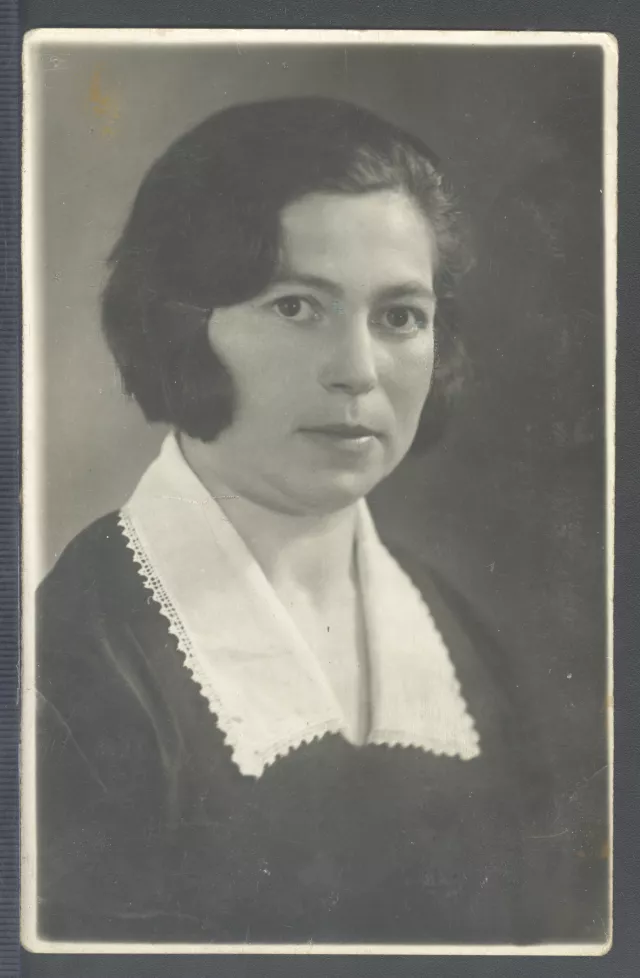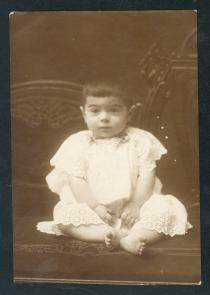This is Aunt Sima, my mother's younger sister, born in 1909, she died in 1980. The photo was taken before the war, in 1940.
My maternal grandfather, Berl (Boris) Slutsky came from Anatovka (I met this name only in literature, everyone called the place Ignatovka. I don’t know why people gave Anatovka the name of Ignatovka. Ignat is a Slavic name, Russian or Ukrainian. This is probably the reason for giving such a name to this plac). As Sholem-Aleichem’s character Tevye, whose family lived not far from Anatovka, my grandfather was a milkman. Grandma even told me that she had seen Sholem Aleichem and his wife, Olga Mikhailovna. Milkmen, as is well known, kept cows, produced sour cream and cottage cheese and sold their products at the market-place. Grandpa was not as sociable and talkative as Tevye. Once in 1919 Grandpa and his son Mikhul, my mother’s brother, loaded their carriage with goods and went to Kiev. As soon as they left Ignatovka, they were attacked by either local bandits or Petlyura bandits. There were two of them. They killed Grandpa and wounded Mikhul in the head. One of the bandits said: ‘They are still alive’. Mikhul lay there silently. The other one said: ‘Leave it, they’ll get finished off’. The bandits took the horse and the goods and left. Only Mikhul with Grandpa’s body remained on the road. When it got dark, he went to Anatovka and told everyone about what had happened.
My maternal grandmother’s name was Rivka, nee Kholemskaya, she became Slutskaya after marriage. She was born in 1863, also lived in Anatovka and got married there. Grandmother and Grandfather were religious people. They had two sons and five daughters; my mother was one of them. Grandma Rivka had three sisters but I don’t remember their names.
Grandpa died and the Slutsky family moved to Kiev. Grandma stayed with her daughters and brother at 4 Basseynaya Street. It was a single-floor building, where they occupied a three-room apartment without any facilities and with a Russian stove. Grandma was illiterate and looked after the house. Her favorite work was to sort out pepper and make pillows. She did not attend the synagogue, never wore a wig, however, she observed all ceremonies. Grandma kept everything kosher in her household; there was even a butcher, a shochet in the yard, who cut chicken on Fridays. Grandma cooked challah every Friday. She baked it in a Russian stove in a special form and it was not twist-shaped. At 5 o’clock Grandma lit the candles, prayed, but there was no family gathering – no Sabbath. The whole family usually gathered only for Jewish holidays, which Grandma always celebrated. I spoke to her in Yiddish. When in 1933 we were not able to buy matzah because it was very expensive, I cooked it for Grandma myself. Mother’s brothers and sisters’ weddings were celebrated according to the tradition – with a chuppah.
The siblings and cousins lived in peace and friendship. Everyone had a big family. All families observed the Jewish way of living. There were no Party members in the family. We were closely in touch and met for holidays, weddings as well as when visiting friends. We were great friends with my father’s cousin, Shloima Maryanchik and rented a summer house together in Svyatoshen. Such gatherings were very cheerful. I remember huge tables covered with plentiful viands, especially during summer time. The children helped adults to set the table and carry the dishes. Children were fed first, so when grownups had their meal, children already played in the yard.
During the war I was in evacuation in Central Asia. However I could not stand the Central Asian climate with its sand and heat. It was very difficult to live there because we had no ration cards. Aunt Sima’s husband died and she invited me to come to Svredlovsk.















